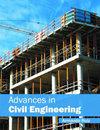用水泥、石灰和偏高岭土基土工聚合物稳定剂稳定的软土的机械强度和微观结构
IF 1.6
4区 工程技术
Q3 CONSTRUCTION & BUILDING TECHNOLOGY
引用次数: 0
摘要
由于软土具有高压缩性、低剪切强度和渗透性,因此在设计土木工程结构时需要特别考虑。使用化学添加剂和土工聚合物来稳定软土是改善其工程特性的一种实用方法。这项研究的目的是探索在使用传统稳定剂的同时使用偏高岭土基土工聚合物。本研究还旨在调查稳定软土的压实特性、机械强度、剪切行为和微观结构。压实试验以土壤干重为基础,使用了不同用量的水泥(6%、8% 和 10%)和偏高岭土(3%、5% 和 7%)。在进行三轴剪切试验时,水泥、石灰和土工聚合物的添加量为软土干重的 15%。压实试验结果表明,水泥含量为 8%时,稳定土的最大干密度最高。在水泥改良土壤中添加偏高岭土(MK)可降低最大干密度,平滑压实曲线,并提高最佳含水量。无压抗压强度(UCS)测试表明,水泥稳定土的屈服应力最大,而在水泥改良土中添加偏高岭土(MK)可降低固化 7 天后的屈服应力。与未经处理的软土相比,水泥稳定土、偏高岭土和石灰稳定土的剪切强度参数都有显著提高。这项研究表明,添加化学添加剂和土工聚合物可以改善软土的压实特性、机械强度和剪切强度参数。本文章由计算机程序翻译,如有差异,请以英文原文为准。
Mechanical Strength and Microstructure of Soft Soil Stabilized with Cement, Lime, and Metakaolin-Based Geopolymer Stabilizers
Soft soils require particular consideration when designing civil engineering structures due to their high compressibility, low shear strength, and permeability. Using chemical additives and geopolymers to stabilize soft soils is a practical approach to improve their engineering properties. The objective of the study was to explore the use of conventional stabilizers alongside metakaolin-based geopolymers. This study also aimed to investigate the compaction characteristics, mechanical strength, shear behavior, and microstructure of stabilized soft soil. The compaction test was carried out using various amounts of cement (6%, 8%, and 10%) and metakaolin (3%, 5%, and 7%) based on the dry weight of the soil. Cement, lime, and geopolymer were added to the soft soil at 15% of the dry weight of the soil for triaxial shear tests. The compaction test results indicated that the stabilized soil exhibited the highest maximum dry density at 8% cement content. Adding metakaolin (MK) to the cement-modified soil decreased the maximum dry density, smoothed the compaction curve, and increased the optimum moisture content. The unconfined compressive strength (UCS) test revealed that cement-stabilized soil had the highest yield stress, while adding MK to the cement-modified soil reduced the yield stress after 7 days of curing. Compared to untreated soft soil, there was a significant increase in shear strength parameters for cement-, metakaolin-, and lime-stabilized soil. This study demonstrates that adding chemical additives and geopolymers can improve the soft soil’s compaction characteristics, mechanical strength, and shear strength parameters.
求助全文
通过发布文献求助,成功后即可免费获取论文全文。
去求助
来源期刊

Advances in Civil Engineering
Engineering-Civil and Structural Engineering
CiteScore
4.00
自引率
5.60%
发文量
612
审稿时长
15 weeks
期刊介绍:
Advances in Civil Engineering publishes papers in all areas of civil engineering. The journal welcomes submissions across a range of disciplines, and publishes both theoretical and practical studies. Contributions from academia and from industry are equally encouraged.
Subject areas include (but are by no means limited to):
-Structural mechanics and engineering-
Structural design and construction management-
Structural analysis and computational mechanics-
Construction technology and implementation-
Construction materials design and engineering-
Highway and transport engineering-
Bridge and tunnel engineering-
Municipal and urban engineering-
Coastal, harbour and offshore engineering--
Geotechnical and earthquake engineering
Engineering for water, waste, energy, and environmental applications-
Hydraulic engineering and fluid mechanics-
Surveying, monitoring, and control systems in construction-
Health and safety in a civil engineering setting.
Advances in Civil Engineering also publishes focused review articles that examine the state of the art, identify emerging trends, and suggest future directions for developing fields.
 求助内容:
求助内容: 应助结果提醒方式:
应助结果提醒方式:


